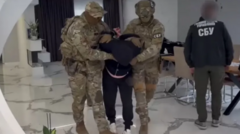As Xi Jinping strengthens his relationship with Vladimir Putin during their recent meetings, he faces the challenge of avoiding international isolation and balancing interests in a shifting global landscape.**
Xi's Tactful Diplomacy: Embracing Putin While Navigating Global Relations**

Xi's Tactful Diplomacy: Embracing Putin While Navigating Global Relations**
President Xi Jinping signals strong ties with Russia, yet cautiously maintains balance amid geopolitical complexities.**
In a powerful display of solidarity, Chinese President Xi Jinping recently paraded alongside Russian President Vladimir Putin in Moscow, reinforcing their alliance amid escalating global tensions. Xi, seated prominently to Putin's right during the Victory Day celebrations, termed their partnership as "unbreakable" while emphasizing the importance of being "friends of steel." This marks Xi's 11th visit to Russia since taking office in 2013, with over 40 meetings between the two leaders, including past gestures of affection such as shared hugs.
However, experts caution that the apparent camaraderie may mask deeper complexities. Mathieu Boulegue from the Center for European Policy Analysis notes the duality in their relationship, where cooperation can quickly give way to rivalry. He emphasizes the importance of understanding the underlying dynamics that inform their interactions.
As Xi seeks to fortify ties with Russia, he must also be wary due to the international fallout from Putin’s invasion of Ukraine, which has alienated much of the global community. While China values its relationship with Russia, it cannot afford to isolate other potential partners, especially as it faces challenges from the U.S. in trade and diplomacy. Recently, Xi engaged with European leaders to strengthen ties, aiming to position China as a stable global player amidst uncertainties surrounding U.S. foreign policy.
The gravity of Xi’s task is underscored by the delicate balance he must maintain; too close an alignment with Putin could jeopardize China's engagement with Europe. Moreover, as the geopolitical landscape shifts, Xi needs to convey a firm message countering any attempts by the U.S. to create a rift between China and Russia. He reiterated their intent to resist any disruptive forces undermining their alliance.
Despite the public displays of support, analysts warn that the power dynamic has altered significantly; Russia now relies heavily on China economically due to sanctions and military losses in Ukraine. As Boulegue points out, “Russia needs China much more than the opposite is true.” This reality poses a potential vulnerability for Putin, highlighting a divergence in their relationship.
While Xi and Putin continue to showcase their partnership at grand military parades amid cheers, the path ahead will demand careful navigation, as discordant elements could emerge, influencing the nature of their alliance in the coming years.
However, experts caution that the apparent camaraderie may mask deeper complexities. Mathieu Boulegue from the Center for European Policy Analysis notes the duality in their relationship, where cooperation can quickly give way to rivalry. He emphasizes the importance of understanding the underlying dynamics that inform their interactions.
As Xi seeks to fortify ties with Russia, he must also be wary due to the international fallout from Putin’s invasion of Ukraine, which has alienated much of the global community. While China values its relationship with Russia, it cannot afford to isolate other potential partners, especially as it faces challenges from the U.S. in trade and diplomacy. Recently, Xi engaged with European leaders to strengthen ties, aiming to position China as a stable global player amidst uncertainties surrounding U.S. foreign policy.
The gravity of Xi’s task is underscored by the delicate balance he must maintain; too close an alignment with Putin could jeopardize China's engagement with Europe. Moreover, as the geopolitical landscape shifts, Xi needs to convey a firm message countering any attempts by the U.S. to create a rift between China and Russia. He reiterated their intent to resist any disruptive forces undermining their alliance.
Despite the public displays of support, analysts warn that the power dynamic has altered significantly; Russia now relies heavily on China economically due to sanctions and military losses in Ukraine. As Boulegue points out, “Russia needs China much more than the opposite is true.” This reality poses a potential vulnerability for Putin, highlighting a divergence in their relationship.
While Xi and Putin continue to showcase their partnership at grand military parades amid cheers, the path ahead will demand careful navigation, as discordant elements could emerge, influencing the nature of their alliance in the coming years.





















